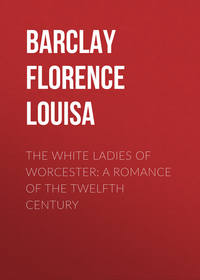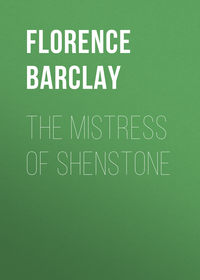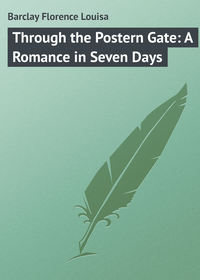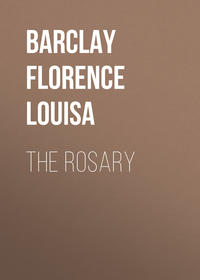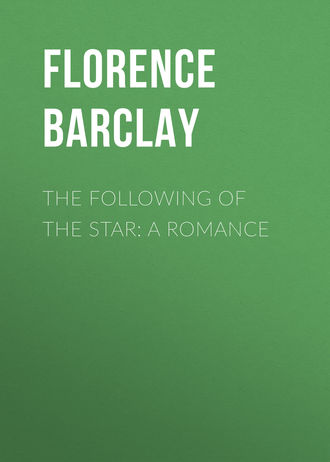 полная версия
полная версияThe Following of the Star: A Romance
"But, may I now say to you, whose faces – after to-morrow – I never expect to see again: Do not lose sight of your star, as you travel across life's desert. Look up, look on; ever, in earnest faith, move forward. Then I can leave with each one in this congregation, as a farewell promise" – he looked at all present; but his eyes met the grey eyes, now swimming in tears, of his Lady of Mystery; met, and held them, with searching solemn gaze, as he uttered his final words —
"Thine eyes shall see the King in His beauty; they shall behold the Land that is very far off."
CHAPTER IV
DIANA RIVERS, OF RIVERSCOURT
Perhaps the greatest tribute to David's sermon, was the quiet way in which the good people of Brambledene rose to their feet at its close.
Lead, Kindly Light was sung with unusual feeling and reverence.
The collection, for Church Expenses, was the largest ever taken in Brambledene Church, within the memory of man. In one of the plates, there was gold. David knew quite well who had put in that sovereign.
He sat at the vestry table and fingered it thoughtfully. He had disrobed while the churchwardens counted the money and commented on the unusual amount of the collection, and the remarkable fact of a sovereign in the plate. They left the money in little piles on the red cloth, for David to carry home and lock up in the Rector's safe.
He had now to enter his text, and the amount of the collection, in the vestry book.
He had glanced down the church as he left the chancel. His Lady of Mystery was still on her knees in the corner near the pillar, her head bowed in her hands. He had seen the top of her grey fur hat, with soft waves of golden hair on either side of it.
He took up the pen and entered his text.
Then he laid the pen down, and glanced at back records of evening collections for Church Expenses. He did not hurry. He could hear very faintly in the distance the throbbing of a motor, waiting at the lich-gate. He knew exactly how it looked, waiting in the snow; two great acetylene lamps in front; delicate electric bulbs lighting the interior, one in each corner of the roof. He knew just how she would look, as the footman tucked the white fur rug around her. She would lean back, rather bored and impatient, and take no more notice of the man, than if he were a machine. David hated that kind of behaviour toward those who serve. He held that every service, even the smallest, should receive a kindly acknowledgment.
He turned the pages of the vestry book. Six shillings and eleven pence. Two and four pence halfpenny. Three and six. Four shillings and nine pence three farthings. Seven and ten pence. And now he was about to enter: "two pounds, eight shillings, and seven pence halfpenny." Even without the gold she had put in, it was a large increase on former offerings. Truly these good people opened their treasures when at last their hearts were touched.
David was alone in the vestry. He could hear old Jabez Bones bustling about in the church, putting out the lamps, occasionally knocking down books, and picking them up again; doing in appearance three times as much as he accomplished in reality.
David took up the pen. He did not hurry. The rhythmic panting of the engine still reached him, faintly, across the snowy mounds. He did not intend to arrive at the lich-gate until that dream-motor had glided noiselessly out of sight.
As he bent over the book to make the entry, the vestry door was pushed softly open. He heard no sound; but a subtle fragrance of violets suddenly surrounded him.
David looked up.
Framed in the Gothic arch of the narrow doorway, her large grey eyes fixed upon him in unwonted gentleness, stood his Lady of Mystery.
David was so completely taken by surprise, that he forgot to rise to his feet. He dropped his pen, but still sat on the high vestry stool, and gazed at her in speechless wonderment.
"I have come," said his Lady of Mystery, and her low-pitched voice was full of music; "I have come to bring you my gifts – gold, frankincense, and myrrh."
"Not to me," said David. "You must not bring them to me. You must bring them to the King."
"I must bring them to you," she said, "because I know no other way. I have sought the Christ, and found HIM not. I had lost my way in the dreary darkness of the desert. To-night you have cleared my sky. Once more I see the shining of the Star. You have shown me that I have these three gifts to offer. But I must bring them to you, David Rivers, because you are the most Christlike man I have ever known, and you stand to me for your King."
"I cannot stand for my King," said David, unconscious of the light in his own eyes, or the divine radiance reflected on his face. "I am but His messenger; the voice in the wilderness, crying: 'Prepare ye the way of the Lord.'"
The Lady of Mystery moved a step nearer, and laid one hand on the vestry table. She bent toward him. Two wax candles, in brass candle-sticks, stood upon the table, on either side of the vestry book, providing the only illumination. In the light of these, they looked into one another's faces.
"You have certainly prepared His way in my heart to-night," she said, "and I believe you are going to make straight for me the tangle of my life. Only, first of all, you must know who I am. Has anybody told you? Do you know?"
"Nobody has told me," said David, "and I do not know."
"What have you called me, to yourself, all these weeks?"
"My Lady of Mystery," answered David, simply; wondering how she knew he had called her anything.
She smiled, and there seemed to be twenty wax candles in the vestry, rather than two.
"Quite pretty," she said; "but too much like a story-book, to be practically useful." She drew a small purple bag from her muff; took out a card, and laid it on the table in front of him. "You must know who I am," she said, "and where I live; because, you see, I am going to ask you to dinner."
She smiled again; and David bent over the card. She marked his involuntary movement of surprise.
"Yes," she said, "I am Diana Rivers, of Riverscourt. Had you heard of me before? I suppose we are, in some sort, cousins."
But David sat with his eyes bent upon the card before him. Alas, what was happening? His Lady of Mystery had vanished. This tall girl, in furs and velvet, with her brilliant smile, sweet low voice, and assured manner, was the greatest heiress in the county; Master of the Hounds; patron of four livings; notorious for her advanced views and fearless independence; a power and a terror in the whole neighbourhood. His Lady of Mystery who, under his guidance, was to become a meek and lowly follower of the Star! Poor David!
He looked so thin and forlorn, for the moment, that Diana felt an amused desire to put him into an armchair, and ply him with champagne.
"Of course I have heard of you, Miss Rivers," he said, slowly. "Mr. Goldsworthy told me all about you, during my first evening at the Rectory. He asked me whether we were related."
"Dear old thing!" remarked Diana, lightly. "He is my god-father, you know; and I think his anxiety over my spiritual condition is the one thing which keeps him of a size to pass through the pulpit door!"
"Don't," said David.
She looked at him, with laughter in her eyes.
"All right, Cousin David. I did not mean to be flippant. And we are cousins, you know."
"I think not," he answered, gravely. "I am of very humble origin; and I never heard of my people claiming kinship with courts of any kind."
"Oh, don't be silly!" retorted Diana, drumming on the vestry table, with her firm, gloved fingers; but her tone was so gentle, that it almost held a caress. "Don't be silly, Cousin David. The humblest people live in courts, in London; and all rivers run into the sea! Nothing but the genuine Rivers' pluck could have faced these good folk Sunday after Sunday; and only the fire of the real old Rivers' stock, could have made them sit up and listen to-night. You look just like grandpapa, confounding the Opposition from his seat on the government benches, when you attack Mrs. Smith for turning over the pages of her Bible in that distracting and senseless way. I can fancy myself back in the Ladies' Gallery, longing to cheer. We must claim kinship, Cousin David."
"I think not," he repeated firmly. He looked very small, and thin, and miserable, huddled up on the vestry stool. His threadbare clerical jacket seemed several sizes too large for him. "Diana Rivers, of Riverscourt!" Oh, where was his dear Lady of Mystery?
If Diana wanted to shake him, she kept the desire well in hand. Her voice grew even deeper; more full of music, more softly gentle.
"Well, cousin or no cousin," she said, "I want your advice, and I can't do without your help. Where do you take your Christmas dinner, David Rivers?"
"Why, at the Rectory," he answered, looking up. "I have no friends here." Then a gleam of amusement passed over his face: "Sarah says, as it is Christmas, she is 'going to a fowl,'" he said.
"I see. And you are planning to eat your fowl in solitary grandeur at the Rectory? Well, I will 'go to a turkey' and a plum-pudding, and, possibly, mince-pies; and you shall dine with me on Christmas night. The idea of a lonely meal on your last – I mean, your one Christmas-day in England!"
"You are very kind," said David; "but is not Riverscourt twelve miles from here?"
"My chauffeur does it in twenty minutes," replied Diana. "It would be as much as his place is worth to take twenty-one. I will send the motor for you at seven, and we will dine at half past. They can run you back whenever you like. Does your household retire early? Or perhaps you are allowed a latch-key."
David smiled. "My household consists of Sarah, Mr. Goldsworthy's faithful housekeeper; and as I usually sit up reading until midnight, she retires early, and trusts me to put out the lamps and to lock up."
"Ah, I know Sarah," said Miss Rivers. "A worthy soul. She and I are excellent friends. We hold the same views on women's rights, and we love discussing them. Mere man – even god-papa – dwindles to nothing, when arraigned at the bar of Sarah's intrepid judgment. Very well, then. The motor at seven."
But David still hesitated. "You are very kind," he said. "But – you see, we don't have dinner-parties in Central Africa. And since I came home, I have mostly been in hospital. I am afraid I haven't" – he looked down at his short jacket. "I don't even possess a long coat," he said, simply.
"Oh don't be tiresome, Cousin David!" cried Miss Rivers. "If I wanted conventional evening dress, I know a dozen men whom I could invite to dinner. I want you, not your clothes. If one is greatly interested in a book, does one bother to consider the binding? Bring your mind along, and come prepared to be helpful; for, God knows" – her eyes grew deep and earnest – "God knows I want helping, more than any of your African savages. Come as you are, Cousin David. Come as the Voice in the Wilderness. It is all I ask. Besides, there will only be myself and Chappie; and Chappie doesn't count."
She drew off a soft grey glove; then held out to him firm white fingers. He took them in his. They clasped hands silently; and, once more, by the light of the two wax candles, looked searchingly into each other's eyes. Each read there a quiet compact of friendship and of trust.
"I will come," said David. She paused with her hand on the door, looking back at him over her shoulder. Her tall head nearly touched the top of the archway.
"If you do," she said, "we must consider the question of your church, your schools, your printing-press, and your steamer. So, au revoir, to-morrow."
She threw him a little reassuring smile, and passed out.
The fragrance of violets, the sound of her low voice, the card upon the table, remained.
David took up the pen and made the entry in the vestry book: two pounds, eight shillings, and seven pence halfpenny. Then he gathered up all the little piles of silver and copper, and put them into his coat pockets; but Diana's sovereign he slipped by itself into one waistcoat pocket, and her card into the other.
Then suddenly he realised – poor David – that she had stood beside him during the whole interview, while he had sat on the vestry stool.
He sprang to his feet. "Oh I say!" he cried. "Oh – I say!"
But there was nothing to say; and no one to whom to say it.
Poor David!
He sat down again, put his elbows on the table, and dropped his head into his hands.
Diana Rivers of Riverscourt! Patron of four livings! Acknowledged leader of the gayest set in the county; known far and wide for her independence of character and advanced views!
Bones came shuffling up the chancel, rattling the church keys. There was also a sovereign of Diana's in his waistcoat pocket, and he showed no irritation as he locked up the vestry book, and returned David's good-night.
"A 'appy Christmas, sir," he said, "an' many of 'em; if they 'ave 'em in them wild parts."
As David plodded home through the snow, his mind dwelt, with curious persistence, on one question: "Now who on earth is 'Chappie'?"
CHAPTER V
THE NOISELESS NAPIER
"I am morally certain 'Chappie' is a poodle," thought David to himself, at breakfast. "It would be just like her to have a large black poodle, abnormally clever, perfectly clipped, tied up with green ribbons to match her hat, and treated in all respects as a human being; excepting that, of course, his opinion on the cut of her guests' clothes would not matter. 'Chappie does not count,' she said; but I'll be bound he counts a lot, in most respects. I hope Chappie will like me. How does one whistle to a poodle?"
David was standing on the hearthrug, practising various seductive ways of whistling to Chappie, when Sarah came in, to clear the breakfast table.
Sarah had put a Christmas card on David's plate that morning, and had kept nervously out of the way, while he opened the envelope. The card had evidently been chosen with great care, and an eye to its suitability. A large bunch of forget-me-nots figured in the centre, tied with a lover's knot of blue ribbon. Above this, two embossed hands – Sarah's and David's of course – were clasped. Above these again, flew two turtle-doves. They carried a scroll between them, depending from either beak, bearing in gold lettering, "The Compliments of the Season." At the bottom of the card were two blank lines beginning with "To – " and "From – ". Sarah had filled in, with much labour, and rather brown ink:
To the Reverant David rivers
From Yours rispectfully Sarah
David, delighted, stood the card in the place of honour on the mantel-piece, in front of the clock. When Sarah came in, he stopped whistling to Chappie, went forward at once and shook hands with her, thanking her warmly for the Christmas card.
"The only one I received, Sarah; and I do think it most awfully pretty."
Sarah admitted that it was that; explained at great length where she got it, and why she chose it; and described a good many other cards she had nearly bought but eventually rejected in favour of the forget-me-nots, thinking they would "look home-like in them outlandish places," and ensure David's kind remembrance of her.
David protested that, card or no card, he would never forget Sarah, and all her thoughtful care of him; and Sarah wiped her eyes with a corner of her apron, and only wished there was more of him to care for.
David felt this rather embarrassingly personal, and walked over to the window to throw crumbs to a robin. Then he turned, as Sarah, having folded the cloth, was preparing to leave the room.
"Sarah," he said, "I have had an invitation. I am dining out to-night."
Sarah's face fell. "Oh, Mr. Rivers, sir! And me going to a chicking, being as it was Christmas!"
"Well, Sarah, you see my friend thought it was dull that I should dine by myself on Christmas night. And if you had gone to a chicken, I should indeed be left alone."
"Get along, sir!" chuckled Sarah. "You know my meaning. And, if it's Smiths or Joneses, I misdoubt if you'll get so good a dinner – "
"It isn't Smiths or Joneses, Sarah. It is Miss Rivers, of Riverscourt. And she has promised me a turkey, and a plum-pudding, and possibly – only I must not count too much on those – possibly, mince-pies!"
Sarah's face expanded. "Oh, if it's Miss Diana, sir, you can't do better. There's none like Miss Diana, to my thinking. And we can have the chicking on Boxing-day. And, with your leave, if I'm not wanted, I'm asked out to friends this evening, which I hadn't no intention of mentioning. And Mr. Rivers, sir; mark my words. You can't do better than Miss Diana. We've known her from a babe, master an' me. Folks talk, because she don't hold with getting married, and because she don't do much church-going; but, begging your pardon, sir, I don't hold with either, m'self. Marriage means slaving away, with few thanks and fewer ha'pence; and church-going mostly means, for women-folk, a vieing with one another's bonnets. I don't go to feathers, m'self; always having been well-content with beads. And I pay my respects to Almighty God, at home."
"'Not forsaking the assembling of ourselves together, as the manner of some is,'" quoted David. "You forget the injunction of the writer to the Hebrews, Sarah."
"That don't hold good for now, Mr. Rivers, sir," replied Sarah, with conviction; "any more than many other hepistolic remarks."
"They all hold good for now, Sarah," said David, gravely.
"Then what about 'let your women keep silence in the churches'? Hark to them rowdy Miss Joneses in the choir!"
"They do make a row," admitted David, off his guard.
"And 'if they will learn anything, let them ask their husbands at home'?" Sarah was evidently well up in her Bible.
"Well, why not?" queried David.
"Why not, Mr. Rivers, sir?" repeated Sarah, scornfully. "Why not? Why because stay-at-home husbands ain't likely to be able to teach go-to-church wives! And, even if they did, how about me an' Miss Diana, as has none?"
This seemed unanswerable, though it had nothing whatever to do with the point at issue. But David had no suggestions to offer concerning the limitations contingent on the spinsterhood of Sarah and of Miss Diana. It therefore gave Sarah the last word; which, to the female mind, means victory; and she bore away the breakfast cloth in triumph.
When she brought in tea that afternoon, she lingered a few minutes, giving the fire a little unnecessary attention, and furtively watching David, as he put salt on his hot-buttered toast.
Then she said tentatively: "Mr. Rivers, sir, there are one or two things about Miss Diana you might as well know, before you go over there."
"No, thank you, Sarah," said David, with decision. "Whatever Miss Rivers wishes me to know, she will tell me herself. Anything she does not herself tell me, I prefer not to hear from others."
Sarah surveyed him; and her look expressed amazement and disapproval.
"Well I never!" she exclaimed. "You are different from master! All I hear in the village I tell master while I wait on him at dinner. He says: 'You may as well tell me what you hear, my good Sarah; and then I can judge how to act.'"
David smiled. He had already discovered the good Rector's love of gossip.
"But you see, Sarah," he said, "being only a locum tenens, I do not, fortunately, have to act."
"Don't disparage yourself, sir," advised Sarah, still disappointed, almost aggrieved. "And even if folks here have called you so, you won't be that to Miss Diana."
"Oh, no," said David, cheerfully. "I do not propose to be a locum tenens to Miss Diana!"
The motor glided up to the Rectory gate at seven o'clock, to the minute. David saw the flash of the acetylene lamps on his bedroom blind.
He ran down the stairs, filled with a delightful sense of holiday-making, and adventure.
His one clerical suit was carefully brushed, and Sarah had "pressed it," a mysterious process from which it emerged with a youthful, unwrinkled air, to which it had for long been a stranger. His linen was immaculate. He had shaved with extreme care. He felt so festive, that his lack of conventional evening clothes troubled him no longer. He slipped Sarah's Christmas card into his pocket. He knew Diana would appreciate the pathos and humour of those clasped hands and forget-me-nots.
Then he went down the garden path, and entered the motor. The footman arranged the fur rug over his knees, showed him how to switch off the electric lights if he preferred darkness, shut the door, took his seat beside the motionless chauffeur, and instantly they glided away down the lane, and turned into the high road leading to Riversmead.
It seemed wonderful to David to be flying along in Diana's sumptuous motor. He had never before been in a powerful noiseless Napier car, and he found it somewhat of an experience. Involuntarily he thought of the time when he had been so deadly weak from African fever, and his people had had somehow to get him to the coast; the rough little cart on wheels they made to hold him and his mattress, and tried to draw him along the apology for a road. But the shaking and bumping had been so absolutely unbearable, that he had eventually had to be slung and carried as far as the river. Even so, there had been the perpetual dread of the agonising jerk if one of his bearers stumbled over a stone, or stepped unexpectedly into a rut. And to all this he was so soon returning. And quite right, too. No man should glide through life on cushioned tyres. For a woman, it was quite otherwise. Her womanhood constituted a sufficient handicap, without any roughness or hardship being allowed to come her way. He liked to know that Diana would always – literally and metaphorically – glide through life in a noiseless Napier. This method of progression need be no hindrance to her following of the star.
He looked at his watch. In ten minutes they would reach Riverscourt.
He switched off the lights, and at once the flying trees and hedges became visible in the pale moonlight. He enjoyed watching them as they whirled past. The great car bounded silently along the road, sounding a warning note upon the horn, if the distant light of any cart or carriage came in sight ahead of them; but passing it, and speeding on in the snowy darkness, before David had had time to look out and see what manner of vehicle it was.
They rushed through little villages, the cottage windows bright with seasonable festivity. In one of them David caught a glimpse of a Christmas-tree, decked with shining candles, and surrounded by the curly heads of happy little children. It was many years since he had seen a Christmas-tree. It brought wistful thoughts of home and boyhood's days. The first Christmas-tree he could remember had yielded to his enraptured hands a wooden popgun, which expelled a cork with great force and a terrifying sound, sufficiently loud to make all grown-up people jump, if it was done exactly behind their heads, when they were unaware of its near vicinity. This effect upon grown-ups, produced by his own popgun, had given him a sense of power which was limitless; until the sudden forcible confiscation of the popgun had set thereto an unexpected limit. He then mentioned it as a flute, and asked for it back; pointing out that its popgun propensities were a mere accident; its real nature was to be a flute. He received it back as a flute, upon condition that it should not immediately accidentally develop again into a popgun. He spent the remainder of that day blowing blissfully into the eight holes punched in the strip of red wood gummed to the side of the popgun. The resultant sounds were melancholy and fitful to a degree; and it is doubtful which was the greater trial to the nerves of the grown-ups, the sudden explosion of the popgun, or the long drawn out piping of the flute. Anyway when his treasure suddenly and unaccountably disappeared, they assisted his tearful search in a half-hearted sort of way, and when eventually his unaided efforts discovered it, carefully concealed in one of their own wardrobes, his infantine faith in the sincerity of adult human nature had received its first rude shock.


